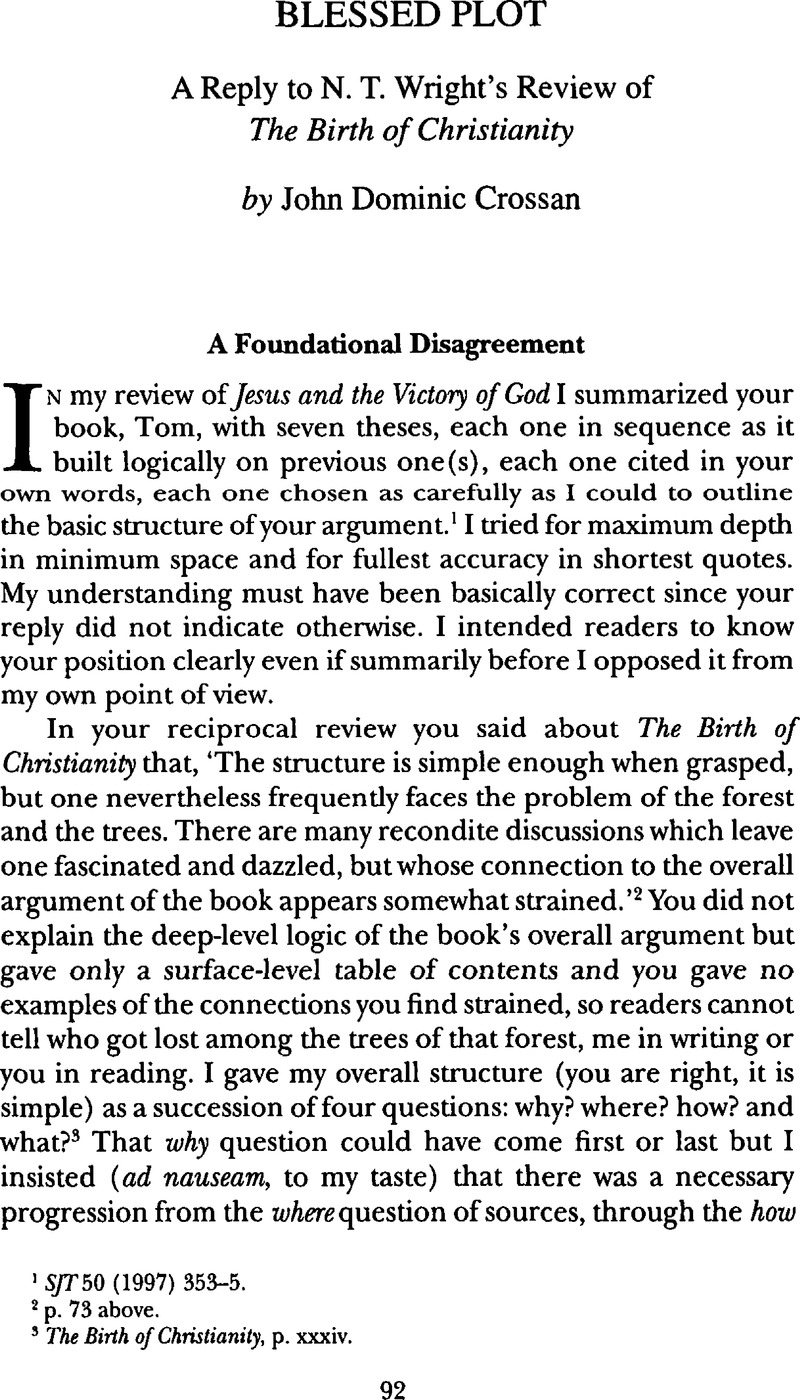No CrossRef data available.
Article contents
Blessed Plot A Reply to N. T. Wright' Review of The Birth of Christianity
Published online by Cambridge University Press: 30 January 2009
Abstract

- Type
- Article Review
- Information
- Copyright
- Copyright © Scottish Journal of Theology Ltd 2000
References
page 92 note 1 SJT 50 (1997) 353–5.
page 92 note 2 p. 73 above.
page 92 note 3 The Birth of Christianity, p. xxxiv.
page 93 note 4 The Birth of Christianity, p. 120.
page 93 note 5 The Birth of Christianity, p. 48.
page 94 note 6 p. 75.
page 94 note 7 p. 75.
page 95 note 8 The Birth of Christianity, p. 96. See, as examples, Jesus and the Victory of God, pp. 87, 517, 554, 662. I took the verb ‘bypassed’ from that p. 87 and, here once again, I decry the sneering condescension (those words are carefully and accurately chosen) with which you describe previous tradition-critical scholarship on those pages.
page 96 note 9 p. 76.
page 96 note 10 The Birth of Christianity, pp. 153–6.
page 96 note 11 The Birth of Christianity, pp. 170–3.
page 96 note 12 The Birth of Christianity, p. 171, quoting Lenski.
page 96 note 13 The Birth of Christianity, p. 172, quoting Lenski, his italics.
page 96 note 14 Lenski, Gerhard E., Power and Privilege. A Theory of Social Stratification (New York: McGraw-Hill, 1966), pp. 262 and 266Google Scholar.
page 97 note 15 p. 75, italics added.
page 98 note 16 pp. 81–2.
page 98 note 17 p. 82.
page 98 note 18 p. 84, italics added.
page 99 note 19 The Birth of Christianity, p. x, italics in original.
page 99 note 20 p. 74.
page 99 note 21 p. 74, note 5.
page 99 note 22 p. 80.
page 99 note 23 Fredriksen, Paula, ‘Judaism, The Circumcision of Gentiles, and Apocalyptic Hope: Another Look at Galatians 1 and 2,’ Journal of Theological Studies 42 (991), pp. 532–564CrossRefGoogle Scholar, gives numerous texts from Jewish tradition describing, on the one hand, a ‘negative eschatology’ in which oppressing pagans would be subjected or exterminated as against, on the other, a ‘positive eschatology’ in which they would be converted not to Judaism's customs but to Judaism's God.
page 100 note 24 p. 82.
page 100 note 25 The Birth of Christianity, p. xxvii.
page 100 note 26 p. 86, italics added.
page 100 note 27 The Birth of Christianity, p.xxvii, with references given there.
page 101 note 28 The Birth of Christianity, p. x.
page 101 note 29 p. 84.
page 101 note 30 The Birth of Christianity, pp. 425–44.
page 101 note 31 The Birth of Christianity, p. 436 (italics original). Note that there I was speaking not just of pre-Pauline tradition but of Paul himself.
page 101 note 32 p. 84.
page 102 note 33 p. 84.
page 102 note 34 The Birth of Christianity, p. 466. See p. 84 above.
page 102 note 35 p. 84.
page 102 note 36 p. 85.
page 103 note 37 pp. 88–9.
page 103 note 38 p. 88, italics added.
page 104 note 39 p. 82.
page 106 note 40 p. 87 (italics added) with footnote 32 to The Birth of Christianity, pp. xiii–xx.
page 106 note 41 Roberts, Alexander, Donaldson, James, and Coxe, A. Cleveland, The Ante-Nicene Fathers. 10 vols. American Reprint of the Edinburgh Edition (New York, NY: Scribner's, 1926). Vol. 1, pp. 216–318Google Scholar.
page 107 note 42 Hoffman, R. Joseph, Celsus: On the True Doctrine (New York, NY: Oxford University Press, 1987), pp. 57–59Google Scholar.
page 107 note 43 pp. 89–91. To save space, I will not transcribe those questions in full but presume that the reader will refer back to them appropriately.
page 107 note 44 p. 90. But ‘caused’ is surely too strong for my contribution. I would hesitate even to say that those injustices in Israel and Ireland were ‘caused’ by past or present British administrations although a better case could be made for that proposal.
page 108 note 45 See, once again, the very important distinction made by Fredriksen in note 23 above.
page 109 note 46 For example, Sibylline Oracles 2:319–24, in a Jewish apocalypse dated to the reign of Augustus, describes how ‘The earth will belong equally to all, undivided by walls or fences … Lives will be in common and wealth will have no division. For there will be no poor man there, no rich, and no tyrant, no slave. Further, no one will be either great or small anymore. No kings, no leaders. All will be on a par together’ (John Collins, Old Testament Pseudepigrapha 1.350–3).
page 111 note 47 p. 90.
page 111 note 48 p. 91.
page 111 note 49 The Birth of Christianity, p. 586. I held that comment for a position as climactic conclusion to the book.




